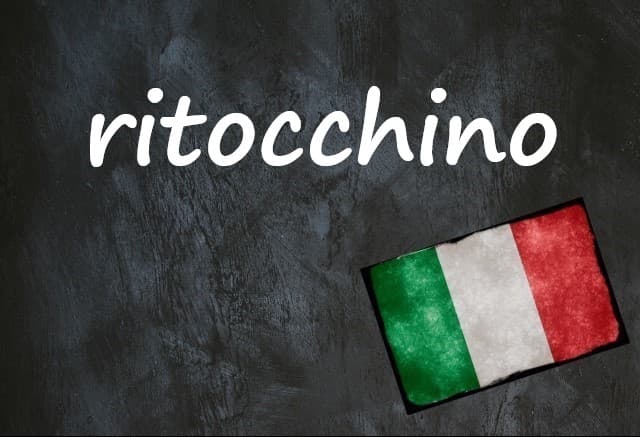Italian word of the day: 'Ritocchino'

If you're trying to perfect your Italian, you'll want to take note of the little things.
Today's word is one that you might not expect to hear someone like Italian prime minister Giuseppe Conte using.
The government keeps making little changes to its current set of coronavirus restrictions, and today they're talking about making even more.
The word Conte used to describe the next update was ritocchino (pronounced ri-tock-EE-noh, remember the "ch" is a hard sound in Italian.)
- "Forse qualche ritocchino ci sarà"
- Maybe there will be a small tweak
One reason it might sound a little unusual coming from someone like the prime minister is that he used the diminutive form of the word ritocco (with the modifying suffix "-ino")
There are quite a few different suffixes used for the diminutive in Italian, including -etto and -ello.
Diminutive forms of words are of course used to describe tiny, cute little things, such as an elefantino (baby elephant) or nasino (little nose)
Or they can change a word slightly to make the meaning nicer and sweeter.
- Mammina migliorerà ogni cosa
- Mummy will make it all better
- Un pensierino per segnare l'occasione.
- A little something (literally “little thought”) to mark the occasion
So it can be a surprise to hear some of these cutesy-sounding diminutive forms used in serious and formal situations.
Sometimes though, such words really just mean that something is small, such as in the case of a motorino (scooter, literally "small engine").
Another reason that Conte's turn of phrase sounded a little odd is that the word ritocchini, meaning little retouches, adjustments, or tweaks made to resolve imperfections, is more often used in the context of, say, plastic surgery, when glossing over just how invasive a procedure could actually be.
In fact, such diminutives can be used as a sort of euphemism or understatement when describing something that's actually quite major. Of course, this can be hard to gauge, and it all depends on context, but you'll no doubt get a feel for it as your Italian comes along.
Who knows how much more we should read into the prime minister's words. But next time you hear someone describing something in the diminutive form, remember that it might not actually be as cute as it sounds.
Do you have an Italian word you'd like us to feature? If so, please email us with your suggestion.
Comments
See Also
Today's word is one that you might not expect to hear someone like Italian prime minister Giuseppe Conte using.
The government keeps making little changes to its current set of coronavirus restrictions, and today they're talking about making even more.
The word Conte used to describe the next update was ritocchino (pronounced ri-tock-EE-noh, remember the "ch" is a hard sound in Italian.)
- "Forse qualche ritocchino ci sarà"
- Maybe there will be a small tweak
One reason it might sound a little unusual coming from someone like the prime minister is that he used the diminutive form of the word ritocco (with the modifying suffix "-ino")
There are quite a few different suffixes used for the diminutive in Italian, including -etto and -ello.
Diminutive forms of words are of course used to describe tiny, cute little things, such as an elefantino (baby elephant) or nasino (little nose)
Or they can change a word slightly to make the meaning nicer and sweeter.
- Mammina migliorerà ogni cosa
- Mummy will make it all better
- Un pensierino per segnare l'occasione.
- A little something (literally “little thought”) to mark the occasion
So it can be a surprise to hear some of these cutesy-sounding diminutive forms used in serious and formal situations.
Sometimes though, such words really just mean that something is small, such as in the case of a motorino (scooter, literally "small engine").
Another reason that Conte's turn of phrase sounded a little odd is that the word ritocchini, meaning little retouches, adjustments, or tweaks made to resolve imperfections, is more often used in the context of, say, plastic surgery, when glossing over just how invasive a procedure could actually be.
In fact, such diminutives can be used as a sort of euphemism or understatement when describing something that's actually quite major. Of course, this can be hard to gauge, and it all depends on context, but you'll no doubt get a feel for it as your Italian comes along.
Who knows how much more we should read into the prime minister's words. But next time you hear someone describing something in the diminutive form, remember that it might not actually be as cute as it sounds.
Do you have an Italian word you'd like us to feature? If so, please email us with your suggestion.
Join the conversation in our comments section below. Share your own views and experience and if you have a question or suggestion for our journalists then email us at [email protected].
Please keep comments civil, constructive and on topic – and make sure to read our terms of use before getting involved.
Please log in here to leave a comment.